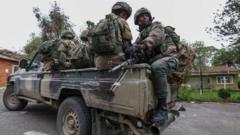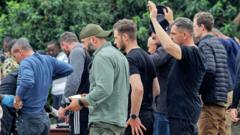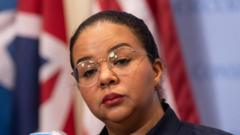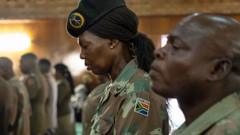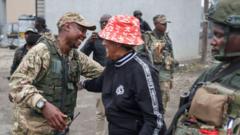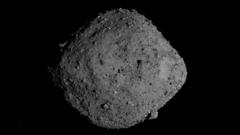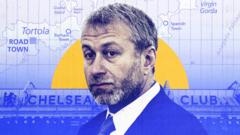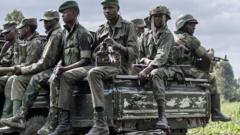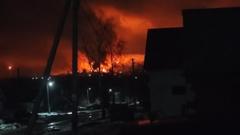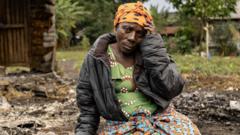Amidst escalating violence in Goma, Rwanda-supported rebels claim to have captured the city, leading to an influx of displaced civilians. Despite international criticism of Rwanda's actions, there has been a lack of effective diplomatic pressure to resolve this burgeoning conflict, reflecting a repeat of past responses—or lack thereof.
Rwanda's Military Interests in Congo Reignite Tensions Amidst Western Indifference

Rwanda's Military Interests in Congo Reignite Tensions Amidst Western Indifference
The ongoing conflict in the Democratic Republic of Congo escalates as Rwanda-backed rebels attempt to take control of Goma, raising international concerns but insufficient responses.
The humanitarian crisis in the Democratic Republic of Congo continues to deepen as Rwanda-backed rebel group M23 makes territorial advances towards the city of Goma. This latest offensive has ignited fears reminiscent of past conflicts, notably the 2012 takeover of Goma, which had prompted global condemnation and sanctions against Rwanda.
In the wake of increasing hostilities, tensions have surged, with hundreds of thousands of civilians fleeing violence in search of sanctuary. As rebels reportedly seize control, analysts express concern that the situation is spiraling into further chaos. The Western nations, while vocal in their criticism, have yet to exert meaningful pressure on the Rwandan government, potentially allowing President Paul Kagame’s administration to persist in its controversial military endeavors.
Although Kagame denies accusations of supporting M23 or deploying Rwandan troops into Congo, many view these claims as smoke and mirrors disguising his aims to expand Rwanda's territorial claims at the expense of Congolese sovereignty. The rebels' narrative of defending ethnic Tutsis—a group significantly affected by the horrors of the Rwandan genocide in 1994—has raised contextual fears regarding potential genocidal rhetoric.
As the situation unfolds, humanitarian organizations are urgently calling for international intervention. However, history suggests that tangible action may lag far behind rhetorical condemnation, remaining to be seen how far the world will go to prevent a repeat of past mistakes that led to catastrophic consequences for the region. With Goma hanging in the balance, the stakes have never been higher, signaling yet another complex chapter in an already fraught relationship between Rwanda and the Democratic Republic of Congo.
In the wake of increasing hostilities, tensions have surged, with hundreds of thousands of civilians fleeing violence in search of sanctuary. As rebels reportedly seize control, analysts express concern that the situation is spiraling into further chaos. The Western nations, while vocal in their criticism, have yet to exert meaningful pressure on the Rwandan government, potentially allowing President Paul Kagame’s administration to persist in its controversial military endeavors.
Although Kagame denies accusations of supporting M23 or deploying Rwandan troops into Congo, many view these claims as smoke and mirrors disguising his aims to expand Rwanda's territorial claims at the expense of Congolese sovereignty. The rebels' narrative of defending ethnic Tutsis—a group significantly affected by the horrors of the Rwandan genocide in 1994—has raised contextual fears regarding potential genocidal rhetoric.
As the situation unfolds, humanitarian organizations are urgently calling for international intervention. However, history suggests that tangible action may lag far behind rhetorical condemnation, remaining to be seen how far the world will go to prevent a repeat of past mistakes that led to catastrophic consequences for the region. With Goma hanging in the balance, the stakes have never been higher, signaling yet another complex chapter in an already fraught relationship between Rwanda and the Democratic Republic of Congo.




